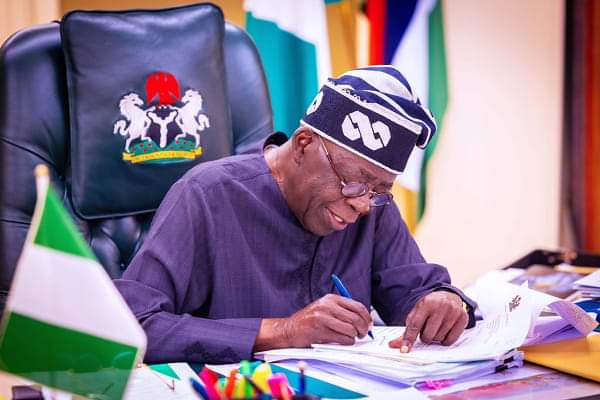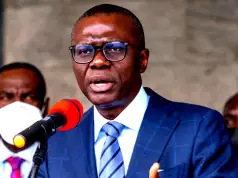President Bola Tinubu has approved seven roads worth $700 million to boost business activities and logistic services at the Lekki Deep Sea Port, it was learnt.
This was gathered to be part of the concerted efforts of President Tinubu to continuously support noble investor efforts such as the Lekki port and others to optimise the rich blue economy inherent in the nation’s maritime domain.
This was disclosed by the chairman of the Lekki Free Trade Zone, Abiodun Dabiri, during the arrival of the largest container carrier to sail on Nigerian territorial waters, birthed at the Lekki Deep Seaport.
The vessel, christened ‘Maersk Edirne’, measures 367M in length and a breadth of 48.2.
It was laden with a Gross Registered Tonnage (GRT) of 142,131 metric tonnes and a Deadweight Tonnage (DWT) of 147,340 metric tonnes, constituting 3,376 total cargo onboard. It was navigated to safety by pilots of the Nigerian Ports Authority (NPA)
The governor of Lagos State, Babajide Olusola Sanwo-Olu was the special guest of honour at the auspicious occasion.
Speaking at the event, Dabiri said that the roads are “clearly going to be a game changer, it is going to be about $700 million.
“It will take off from Lekki. It will fly over through the lagoons and terminate around Sagamu. It will facilitate the evacuation of goods and services into the hinterland and we can’t wait for it to happen.”
In his address, Sanwo-Olu affirmed that the accomplishment of Lekki Port in welcoming the largest LNG-powered container vessel, CMA CGM SCANDOLA, within just one year, has enshrined the names of Lagos and Nigeria as significant players in global port transactions.
Sanwo-Olu said the grand arrival of the vessel was a milestone that positions Lagos as a major mover in the world’s maritime trade
He also emphasised the transformative role of Lekki Port, in putting Lagos and Nigeria on the map of global.
Highlighting the historical significance, Sanwo-Olu acknowledged the foundational role of Lekki seaport in developing Apapa and Tin Can ports.
The governor underscored the need for expanded infrastructure, applauding the choice of Lekki as a home for the Lekki Freeport or Lekki Deep Port.
The governor further said that the vision for the state extended beyond the current achievement, envisioning Lagos as a pivotal hub not only for West Africa but for Central and potentially South Africa in the realm of logistics and container terminals.
He reiterated President Bola Ahmed Tinubu’s economic goals, emphasising the crucial role of maritime and port business in driving the nation towards a $1 trillion economy by 2030.
Sanwo-Olu also expressed the determination to make Lagos the safest part of sub-Saharan Africa, fostering an environment where businesses thrive and investments are secure.
He said his vision painted Lagos as a leader, acting as a catalyst for economic development on the continent.
According to him: “I think it’s a big feat. It’s something that we really need to roll out drums and get proud of because what that is about is about, indeed, we’re putting Lekki Freeport, we’re putting Lagos, we’re putting Nigeria into the world’s global logistics marine business.
“This is a business that has been a privilege to a few countries, developed countries in America, in Europe, in the Far East, in some parts of Africa as well.
But now, given the size of the business that can come to our community, the Lekki Freeport and the Lekki Port itself, have put and enshrined our name as one of the big movers of port transactions in the world.”
Speaking earlier, the minister of marine and blue economy, Adegboyega Oyetola who was represented by the Managing Director of Nigeria Ports Authority (NPA), Mohammed Bello Koko commended the promoters of the Lekki Deep Seaport and its eco-friendly measures, aligning with global efforts to reduce carbon intensity in international shipping.
The minister also praised the NPA’s compliance with the Ministerial directive to embrace global energy transition in its port modernization project.
The minister emphasised the pivotal role of shipping in global decarbonization efforts, citing the IMO’s strategy aiming for a 40 percent reduction in carbon intensity by 2030.
He commended Lekki Deep Seaport for not only being Nigeria’s first Deep Seaport but also the first fully automated port, aligning with international standards.
Oyetola also shed light on the importance of Lekki Port’s natural depth, state-of-the-art equipment, and robust infrastructure, which positions it as a mega transshipment hub with a capacity of up to 1.2 million TEUs in its initial phase.
He stressed the imperative of making ports eco-friendly to comply with international regulations, pointing out Nigeria’s commitment to minimizing air pollution by transitioning to LNG.
“The Ministry of Marine and Blue Economy is convinced that shipping has a pivotal role to play in global decarbonisation efforts, this is why I would like to seize this moment to commend the Management of the Nigerian Ports Authority’s compliance with the Ministerial directive to take cognizance of global energy transition in its port modernization project by deliberately factoring in measures that promote energy efficiency.
Apart from its distinctive feature of eco-friendliness, “Scandola” ranks amongst the largest container ships to be called in West Africa with 15,000 TEUs. Lekki Deep Seaport’s natural depth of 16 meters added to its multifaceted efficiencies, state-of-the-art equipment, and robust infrastructure which offers a capacity of up to 1.2 million TEUs in this phase 1 position the Port to serve as a mega transshipment hub, to Nigeria’s neighbouring countries in the Gulf of Guinea and beyond. With shipping volumes promising to get higher, forward-looking investments such as the one we are gathered here to celebrate will certainly have a big impact in the long run.
“The imperative of making our Ports eco-friendly is no fluke. We will continue to support the NPA in its efforts to ensure stakeholders’ compliance with the International Maritime Organization (IMO) Sulphur Regulation on Nigerian Waterways. The driver of this change is the need to minimize the air pollution created in the shipping industry by reducing the Sulphur content of the fuels that ships use. So transition to the use of natural gas which is more environmentally friendly by vessels plying our waterways is a most welcome development.
He said also that “to put action behind our word, we have taken concrete steps towards the procurement of necessary tools to enhance NPA’s capacity for Sulphur analysis as well as put in place a sanction regime for vessels who contravene the Sulphur regulations. This is driven by in the larger national interest because Nigeria’s gas quality is reputed to be high and virtually without Sulphur. I have said all of these to show that we align with the global discourse which posits that the reduction in the use of heavy hydrocarbons and increasing the use of LNG in maritime transport could help reduce carbon dioxide emissions and other pollution arising from international trade. “
He said: “This is a step in the right direction as we confront the challenges associated with climate change and air quality. Before I take my seat, let me commend Lekki Deep Seaport for recording another remarkable first, in addition to being Nigeria’s first Deep Seaport and first fully automated Port.”
In his address, the Managing Director of Lekki Deep Seaport, Du Rougang, said that the berthing of the vessel is creating a new plan for Nigeria’s ports.
“We want to ensure that Lekki Port plays a major role in the nation’s maritime industry.”





![Late Chinyere Gladys Mbakwe Set For Burial Feb. 20 In Umuahia [SEE POSTER] Mrs. Chinyere Gladys Maduabuchi Mbakwe Set For Burial Feb. 20 In Umuahia [SEE POSTER]](https://abntv.com.ng/wp-content/uploads/2026/02/FB_IMG_1771516412563-300x194.jpg)




![Late Chinyere Gladys Mbakwe Set For Burial Feb. 20 In Umuahia [SEE POSTER] Mrs. Chinyere Gladys Maduabuchi Mbakwe Set For Burial Feb. 20 In Umuahia [SEE POSTER]](https://abntv.com.ng/wp-content/uploads/2026/02/FB_IMG_1771516412563-100x75.jpg)